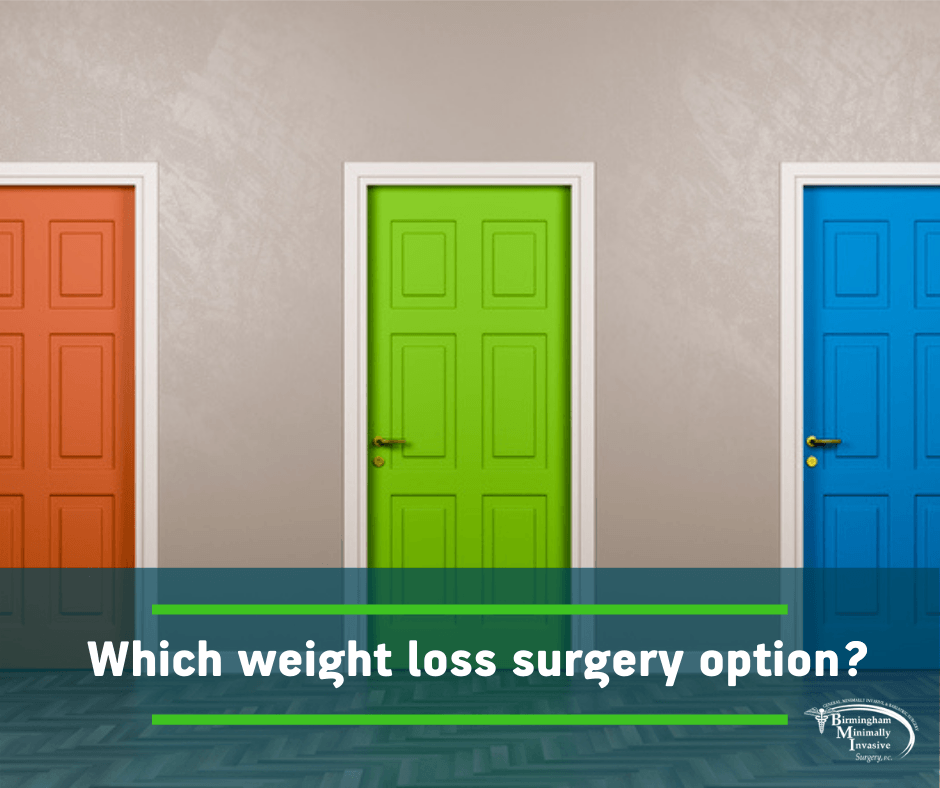

You’ve been thinking about it for a while. You follow us on Facebook. You read our blog posts every month and keep coming back to our website again and again. You even know someone who’s had weight loss surgery and have talked to them about it.
But you still haven’t done it yourself. We know it’s a big decision. The decision to change your life and potentially save your life is enormous. So will 2021 be the year when you finally go for it?
Making the Decision to Have Weight Loss Surgery
Our surgeon, Dr. Jay Long, is the best in finding the right weight loss surgery option for you. He’s also the best when it comes to performing all of these procedures. Dr. Long, along with other team members, will be with you every step of the way to help you achieve the best possible outcome.
We have three primary weight loss surgery options: gastric sleeve surgery, gastric bypass surgery, and the LAP-BAND. Here is some basic information about them all.
Gastric Sleeve Surgery
Gastric sleeve surgery is a minimally invasive procedure that can help you lose weight and keep it off. It is a very popular procedure at Birmingham Minimally Invasive for many reasons. One significant advantage is that we perform gastric sleeve laparoscopically, which means there is a shorter recovery time than other bariatric surgeries, allowing you to resume your normal daily life sooner.
Compared to other options, gastric sleeve is considered to be a more straightforward procedure. We cut away the top and largest part of the stomach and remove about two-thirds of it. We do not reroute the intestines. It typically takes only about 30 to 45 minutes, and there are no large abdominal incisions. After gastric sleeve, patients usually experience less pain, shorter hospital stays, and faster overall recovery.
Gastric Bypass Surgery
Gastric bypass is often an excellent option for our heavier patients because most lose up to 80% of their excess body weight instead of about 60% with a gastric sleeve. This rapid weight loss can be beneficial for those with more severe health issues, such as sleep apnea, high blood pressure, and diabetes. It’s also a good option for anyone with severe acid reflux or poorly controlled diabetes since gastric bypass has been proven to cure both.
With gastric bypass (also called Roux-en-Y), we create a small stomach pouch that restricts food intake. Doing so reduces the amount of food you can take in because your stomach holds only one to two ounces. This bypass also reduces the absorption of nutrients and thereby reduces calorie intake.
We have heard that some people think gastric bypass is more invasive than other options, but we take a minimally invasive approach. We typically make six incisions, and it’s done entirely laparoscopically. It is a little more labor-intensive for the surgeon, but the inpatient surgery takes only one to two hours and requires a hospital stay of one or two nights.
The LAP-BAND
We typically perform the LAP-BAND procedure in our outpatient surgery center, and you are usually discharged the same day. Some patients prefer the LAP-BAND because it is not permanent. We are not changing the stomach anatomy, and we can take the LAP-BAND out if you choose to do so.
With this procedure, we place the LAP-BAND near the top of the stomach, where it meets the esophagus. This creates a tiny pouch that empties into the larger remaining portion of the stomach. We connect the band to a port, which is located underneath the skin of the abdomen. This port is how we put fluid in the band, which allows us to make the band opening larger or smaller in size, providing more or less restriction.
Why the Time for Weight Loss Surgery is Now
We all know that we should lead a healthy lifestyle. We should maintain an appropriate weight, eat healthy foods, and exercise. But one thing we learned on a much more specific level in 2020 is that being overweight or obese can lead to devastating results for diseases, such as COVID-19 and many others.
You need to get healthy now so that your body can better handle anything that comes its way in 2021 and every year after that. With all three of our weight loss surgeries, the goal is for you to lose weight and become healthier, hopefully eliminating or reducing the severity of other health issues.
Let BMI Surgery help you get healthier and achieve your goals in 2021!
The caring group of professionals at Birmingham Minimally Invasive Surgery will help you get started on your weight loss journey and stay with you every step along the way. Dr. Long and his team specialize in all types of bariatric surgery, including gastric sleeve surgery, gastric bypass, and the LAP-BAND. Visit us today at http://www.bmisurgery.com/ or give us a call to set up a consultation at 205-833-6907.










